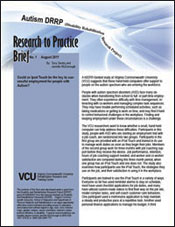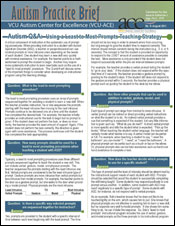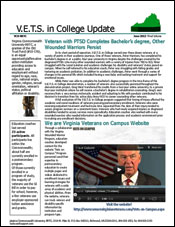Information, resources and research about work and disability issues
VCU Autism Center for Excellence Webcast
Transition for Youth with Autism from School to Adulthood: Critical Considerations
Date: 8/14/2012 |
Time: 3:30 - 4:30 pm ET
By: Paul Wehman
An increasing number of individuals with ASD are now entering high school and transitioning to adulthood. For the student with ASD to have a successful transition to adulthood, tremendous planning and preparation is required. Transition planning must begin long before the student enters high school. This presentation will provide a brief overview of the research regarding the outcomes of adults with ASD and will discuss the primary areas of concern for this group, including employment, residential living, social interactions, and community integration. There will be special emphasis on case studies of Project SEARCH outcomes as well as the VCU-RRTC supported employment program for young adults with ASD. Dr. Wehman will discuss how to determine the student's curriculum and prioritize skills through assessment and transition planning using an ecological approach. Further, he will outline the importance of using the natural environment as the student's classroom and will discuss examples of how to do this effectively.
Register for this webcast or Register for the Series. Cost: $50. * Free to Virginia participants.
VCU-ACE is funded by the VA DOE (Grant # 881-61172 H027A100107). For additional information, contact autismcenter@vcu.edu or (855) 711-6987.
VCU ASD Career Links Webcast
Supporting Individuals with Autism Spectrum Disorders through a Model Public VR Program
By: James Rothrock, Joseph Ashley, Richard Kriner
Date: 8/20/2012, 2:00pm ET
In 2008, VCU-RRTC in partnership with the Virginia Department of Rehabilitative Services implemented the VCU ASD Career Links Grant, a federally funded research project for conducting evidence-based research on vocational rehabilitation (VR) service models for individuals with Autism Spectrum Disorders (ASD). For VA DRS, this research has resulted in agency investment in new practices and services, as well as positive employment outcomes for persons with ASD. Virginia's emerging model program for individuals with ASD may offer a solution for VR agencies facing a surge of new clients with ASD and a lack of existing research on evidenced based strategies to improve historically bleak employment outcomes. Find out More & Register Online. Cost is $25.
This project is funded by the Disability and Rehabilitation Research Project (DRRP) grant #H133B080027 from the National Institute on Disability and Rehabilitation Research (NIDRR).
Autism DRRP
 Examing Employment Impacts of Vocational Rehabilitation Service Provision for Persons with Autism Sepctrum Disorder
Examing Employment Impacts of Vocational Rehabilitation Service Provision for Persons with Autism Sepctrum Disorder
By: David Dean University of Richmond
This project seeks to identify the efficacy of a specific mix of vocational rehabilitation (VR) services on the short and long-term employment-related outcomes for persons with autism spectrum disorder (ASD) while controlling for the receipt of federal disability benefits. There are three components that need to be measured to identify VR impacts for persons with ASD. The specific mix of VR services is aggregated from a veritable "laundry list" of services purchased and/or provided by a VR agency to augment an individual's labor force attachment (e.g., resume writing, job placement) and/or their human capital development (e.g., job training, post-secondary education). The proposed vocational outcomes examined are the employment probability for a given period of time and the level of earnings during that period. The federal disability benefits are Disability Insurance (DI) and/or Supplemental Security Income (SSI) payments made by the Social Security Administration (SSA). Read the Research to Practice Brief No. 3
This project is funded by the Disability and Rehabilitation Research Project (DRRP) grant #H133B080027 from the National Institute on Disability and Rehabilitation Research (NIDRR).
Upcoming Online Courses
![]() Supported Employment Web-Based Certificate Series
Supported Employment Web-Based Certificate Series
ACRE Certified - August 20, 2012 | Details & Register Online
![]() Supported Competitive Employment for Individuals with Mental Illness ACRE Certified - August 20, 2012 | Details & Register Online
Supported Competitive Employment for Individuals with Mental Illness ACRE Certified - August 20, 2012 | Details & Register Online
![]() Supported Employment for Individuals with Traumatic Brain Injury September 3, 2012 | Details & Register Online
Supported Employment for Individuals with Traumatic Brain Injury September 3, 2012 | Details & Register Online
![]() Customized Employment - September 17, 2012 | Details & Register Online
Customized Employment - September 17, 2012 | Details & Register Online
![]() Customized Supported Self-Employment - September 24, 2012 | Details & Register Online
Customized Supported Self-Employment - September 24, 2012 | Details & Register Online
VCU-ACE Q&A Factsheet
 Using a Least to Most Prompts Teaching Strategy
Using a Least to Most Prompts Teaching Strategy
A critical component of instruction is the systematic use of prompting procedures. When providing instruction to a student with Autism Spectrum Disorder (ASD), a teacher or paraprofessional can use minimal prompts or more intrusive ones depending on the needs of each student. One student may learn a new skill very quickly with minimal assistance. For example, the teacher points to a math worksheet to prompt the student to begin. Another may require more systematic instruction to learn new tasks such as the use of a "least to most prompts" procedure. This Q and A will discuss some of the important things to consider when developing an instructional program using this teaching strategy. Read the Fact Sheet
VCU-ACE is funded by the VA DOE (Grant # 881-61172-H027A100107). For additional information, contact autismcenter@vcu.edu or (855) 711-6987.
The Center on Transition to Employment for Youth with Disabilities Issue Brief
 The Impact of Personnel Factors on Employment Outcomes of Urban At-risk Youth
The Impact of Personnel Factors on Employment Outcomes of Urban At-risk Youth
By:
G. Tilson & O. Muñoz-Lorenzo
Now in its third decade, the field of transition to adult life for youth with
disabilities has amassed a history of legislation, regulation, policy, models of intervention, and research related to the processes leading to expected post high school outcomes (Carter, Austin & Trainor, in press). Through substantial efforts to identify the key variables in successful transition to employment, a number of predictors have emerged (Test, Mazzotti, Mustian, Fowler, Kortering
& Kohler, 2009). What We Know
The Center for Transition to Employment is a Disability Rehabilitation Research Project sponsored by The National Institute on Disability and Rehabilitation Research, U.S. Department of Education. The Center is operated by TransCen, Inc. in partnership with Virginia Commonwealth University.
V.E.T.S. in College Update
 Veteran with PTSD Completes Bachelor's degree, Other Wounded Warriors Persist
Veteran with PTSD Completes Bachelor's degree, Other Wounded Warriors Persist
In its short period of operation, V.E.T.S. in College served over three dozen veterans at a variety of points in their academic journeys. One of those veterans, Peter Harrison, has completed his bachelor's degree in at a public, four-year university in Virginia despite the challenges created by his diagnosed PTSD. Like many other wounded warriors with a variety of injuries from TBI to SCI, Peter struggled with the social isolation and academic challenges his disability and veterans' status posed on campus. When he self-referred to his education coach, Peter was struggling with failing grades and teetering on academic probation. In addition to academic challenges, Peter went through a series of changes in his personal life which included having a new baby and seeking treatment and support for emotional issues.
Read the June 2012 Newsletter
V.E.T.S. in College is funded by a grant from the Commonwealth Neurotrauma Initiative (CNI) Trust Fund (#10-176), administered by the Virginia Department of Rehabilitative Services.
 Worksupport.com
Worksupport.com